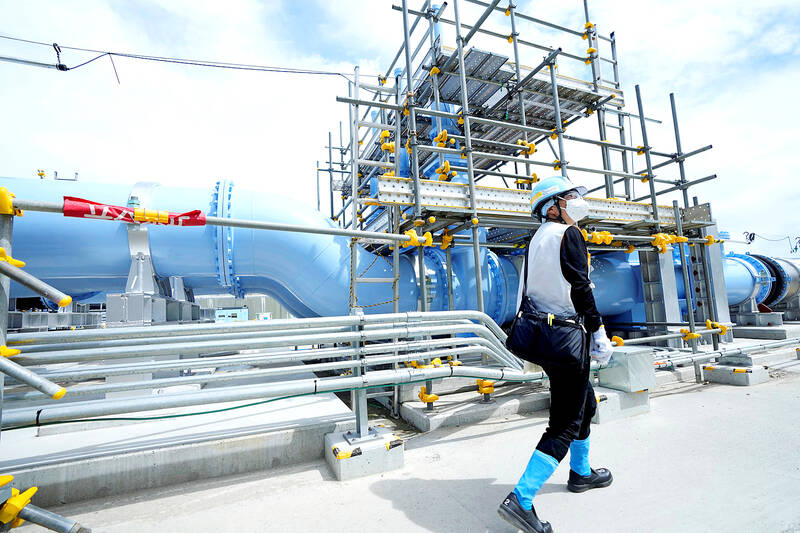Japan has been told that if the radiation levels in the treated nuclear wastewater from its disabled Fukushima Dai-ichi nuclear power plant exceed safety standards in waters around Taiwan, it should stop the release of the water, a Taiwanese diplomat said on Thursday.
The diplomat, who asked to be identified only as an official from the Ministry of Foreign Affairs’ Taiwan-Japan Relations Association, said that Taiwan’s conditions were put forth to the Japanese government by the association and the Taipei Economic and Cultural Representative Office in Japan.
Taiwan has also asked to put the issue on the regular agendas of the annual Taiwan-Japan dialogue on oceanic affairs and the annual discussions between the Atomic Energy Council (AEC) and its Japanese counterpart, the diplomat said.

Photo: Reuters
The aim of that suggestion is to devise the best ways to monitor the safety levels of the treated radioactive wastewater being released, the diplomat said.
JAPAN ACKNOWLEDGES
The Japanese representative to whom that proposal was presented has agreed to forward it to the country’s government and would inform Taiwan of the response in due course, they said.
The terms Taiwan has put forth for stopping the discharge of the treated radioactive water have been acknowledged by the Japanese government, which has said only that it understands Taiwan’s position on the issue, they added.
The diplomat was commenting on the government’s response to a protest held on Wednesday in front of the Japan-Taiwan Exchange Association by Taiwanese non-governmental organizations against the release of the nuclear wastewater.
The Cabinet on Wednesday said the nuclear wastewater would take a year or two before it reaches the Taiwan Strait.
The radioactive substance tritium is projected to reach its maximum concentration in nearby waters in four years, Cabinet spokesman Lin Tze-luen (林子倫) said, adding the expected maximum level is lower than the usual concentration of tritium in the waters around Taiwan.
As such, the impact on radiation-related safety near Taiwan is expected to be “negligible,” he said.
The AEC said the government had a plan to protect the public from radioactive ocean contamination by taking measures such as monitoring changes in the ocean flow and checking more frequently for radioactive residues in aquatic products.
The Fisheries Agency also said that a cross-ministerial task force in Taiwan had been monitoring food safety since the meltdown at the Fukushima Dai-ichi nuclear power plant in the wake of the 2011 tsunami in Japan.
In preparation for Japan’s release of the treated nuclear wastewater, government agencies have expanded their testing of marine products, the agency said.

An essay competition jointly organized by a local writing society and a publisher affiliated with the Chinese Communist Party (CCP) might have contravened the Act Governing Relations Between the People of the Taiwan Area and the Mainland Area (臺灣地區與大陸地區人民關係條例), the Mainland Affairs Council (MAC) said on Thursday. “In this case, the partner organization is clearly an agency under the CCP’s Fujian Provincial Committee,” MAC Deputy Minister and spokesperson Liang Wen-chieh (梁文傑) said at a news briefing in Taipei. “It also involves bringing Taiwanese students to China with all-expenses-paid arrangements to attend award ceremonies and camps,” Liang said. Those two “characteristics” are typically sufficient

A magnitude 5.9 earthquake that struck about 33km off the coast of Hualien City was the "main shock" in a series of quakes in the area, with aftershocks expected over the next three days, the Central Weather Administration (CWA) said yesterday. Prior to the magnitude 5.9 quake shaking most of Taiwan at 6:53pm yesterday, six other earthquakes stronger than a magnitude of 4, starting with a magnitude 5.5 quake at 6:09pm, occurred in the area. CWA Seismological Center Director Wu Chien-fu (吳健富) confirmed that the quakes were all part of the same series and that the magnitude 5.5 temblor was

The brilliant blue waters, thick foliage and bucolic atmosphere on this seemingly idyllic archipelago deep in the Pacific Ocean belie the key role it now plays in a titanic geopolitical struggle. Palau is again on the front line as China, and the US and its allies prepare their forces in an intensifying contest for control over the Asia-Pacific region. The democratic nation of just 17,000 people hosts US-controlled airstrips and soon-to-be-completed radar installations that the US military describes as “critical” to monitoring vast swathes of water and airspace. It is also a key piece of the second island chain, a string of

The Central Weather Administration has issued a heat alert for southeastern Taiwan, warning of temperatures as high as 36°C today, while alerting some coastal areas of strong winds later in the day. Kaohsiung’s Neimen District (內門) and Pingtung County’s Neipu Township (內埔) are under an orange heat alert, which warns of temperatures as high as 36°C for three consecutive days, the CWA said, citing southwest winds. The heat would also extend to Tainan’s Nansi (楠西) and Yujing (玉井) districts, as well as Pingtung’s Gaoshu (高樹), Yanpu (鹽埔) and Majia (瑪家) townships, it said, forecasting highs of up to 36°C in those areas